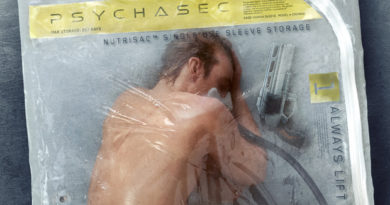Altered Carbon Episode 3 Review: In a Lonely Place
This Altered Carbon review contains spoilers.
Altered Carbon Episode 3
In this episode of Altered Carbon, Kovacs tells Elliot, “Don’t take this personally, but I don’t care about anyone. But if it gets me what I want, I’ll still help them.” Don’t believe it for a second! Yes, these reviews have made note of Joel Kinnaman’s one-note action hero portrayal of Kovacs thus far, but several scenes contradict his insistence on emotional detachment, and the character development both for the Envoy and for those he connects with enriches the series immensely.
The opening sequences in the series so far have been encumbered by overly philosophical voiceovers about abstract notions of violence and the human soul. Not so in “In a Lonely Place”! The glimpse of Kovacs’ past as he reads about the patchwork man with his sister is one of the most informative flashbacks yet, both to explain the cultural mashup name, Takeshi Kovacs, by seeing his abusive Slavic father and beleaguered Japanese mother and to add some humanity to the Envoy’s tough exterior by showing why he places such importance on family.
It almost seems as if Kovacs is building a family, in fact, by adding Vernon Elliot to his team, however tenuously, along with Poe, whose sidekick aspects we’ve already seen. In one of the flashbacks, Quell talks about the necessity of Envoys building a pack when needlecasting to a planet, but something tells me Elliot and Poe won’t always be considered expendable assets. There’s something about using Bancroft’s expense account to get Lizzie psychosurgery that makes it seem like more than an investigative necessity, especially since Kovacs doesn’t think Bancroft killed her.
Of course, that beryllium credit line is also good for some sweet weapons purchases, and the more light-hearted scenes such as Kovacs’ and Elliot’s shopping trip add to the camaraderie and occasionally lift the otherwise heavy mood. Even when Elliot gets to use the knife laced with Reaper on a fellow ex-marine working security at Bancroft’s, it has a comedic feel as he reminds his victim to use some analgesics when he awakens. Kovacs’ other companion, Poe, has a more obvious humorous bent, and it’s enough to make viewers wish he actually could be more than a token mascot for Team Kovacs.
Since the rest of the episode is filled with the repulsive over-indulgence of the Meth society, even the tense banter between Ortega and Kovacs feels like two sides of the same coin. For example, when they both inform the gladiator couple that their kids, ages 5 and 7, aren’t actually used to their parents constantly coming home in new sleeves, their momentary agreement shows they’re not truly enemies. The real villains are people like the woman who put a rapist’s DHF inside a snake, the daughter who borrowed her mom’s sleeve to shtup the security guard, and the many wealthy guests dining on tiger meat.
What does Bancroft hope to accomplish by inviting his suspect list and having Kovacs make the rounds? His cursory questioning elicits a truth from one guest who notes there’s no point in carrying grudges over centuries; all of the Meths are resigned to being stuck with each other. It seems as though Bancroft just wanted to brag to his guests about acquiring the last Envoy, to force his pet mercenary to jump into the anti-gravity ring to prevent the perceived injustice of seeing a married couple beat each other so brutally, and to goad Kovacs with the aphorism: “In this world, the only real choice is between being the purchaser and the purchased.”
Kovacs even goes so far as to apologize to the Osaka businessmen for Isaac Bancroft’s drunken disrespect. It’s almost as though Kovacs, being over 250 years old, is an old man sharing a familiar lament: “Kids these days!” As he observes to Bancroft, because people like Isaac are inescapably their long-lived parents younger children, they’re never really allowed to grow up, and their eternal adolescence is one of the many abhorrent aspects of the Meth culture.
It all serves to bring the more reasonable characters together even though they are at odds. Yes, Elliot screwed up by pursuing his daughter’s case instead of helping Kovacs; yes, Kovacs tells Elliot to “wait ten minutes” when the grieving father declares he likes the cop. But to the audience, the contrast between the unscrupulous Meths and the moralistic protagonists (even if they follow their own code) solidifies their sympathy for those they’re supposed root for. It’s very skillful manipulation on the writers’ part.
The pivot at the end of the episode sets the stage for the brutal episode to come. Anyone who didn’t expect Dimitri to come back in a different sleeve should check their cyberpunk membership card at the door. Altered Carbon has done a wonderful job of unraveling the mystery, building the characters, painting the societal backdrop, and laying the foundation with its flashbacks to when it all began. It may feel more like a ten-hour movie than a episodic series, but it sure is an enjoyable one.


